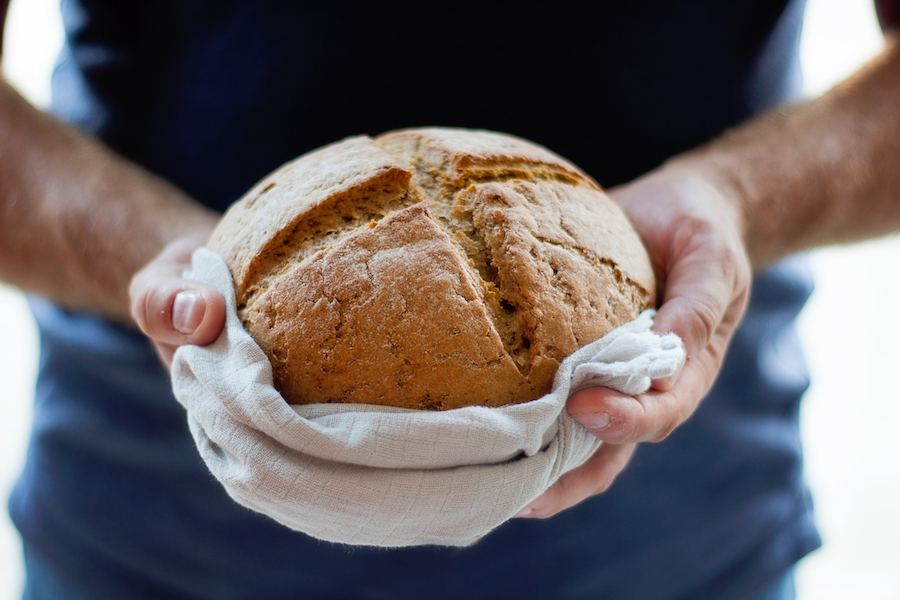
Sarah K. Stephens
Contributor
March, in my opinion, is the perfect month for baking.
It’s still cold enough that heating up your kitchen isn’t a burden, but the weather outside also gives you sneak peeks of Spring, leaving you anxious to experiment with colors and flavors that invite renewal after a dark and cold winter.
I find myself incorporating lemons into almost everything I bake, along with those clear harbingers of summer: strawberries and rhubarb (which we harvest at the end of summer and keep snuggled in our freezer until needed).
Baking in and of itself has always been an act of replenishment for me. After I lost my father suddenly five years ago, baking became my the primary source of respite from my grief (along with my now beloved P.D. James novels). The cookbooks I pored over the most came from my favorite baker, Gesine Bullock-Prado, who describes in her own memoir, My Life From Scratch, how baking became her own source of comfort after her mother died.
Gesine’s recipes range from the relatively basic, such as cookies and vanilla cake, to the weekend baking challenge of puzzle cakes and hot and heavy sugar work. I embraced it all as I tried to recalibrate my life without my father’s comforting voice to guide me through it. In an unpredictable world, I’ve found there is great comfort to be had from the reliable effects of combining warm water, yeast, and flour into a bubbling cauldron of life or crumbling butter, sugar, and flour together into a dependably tender and delicious shortbread.
But even in its seeming predictability, baking can be a deceptive minx—if you become too lax with the rules and begin to cut corners, the ingredients let you know that all is not well. And perhaps that’s also why I’ve found such solace in baking during the painful times of my life—because it’s a clear reminder of the power of remaining patient with ourselves. Don’t rush, take your time, do it right—these are phrases that are universally advantageous whether deployed in or out of the kitchen.

Baking is a skill that encourages consistency and thoughtfulness, both of which are qualities that I’d argue enhance a person’s own approach to life in general. Unlike cooking, which tends to thrive in improvisation and quick-thinking, baking requires an attention to detail and the repetition of what may seem like mundane actions, but are in fact essential processes.
Take, for instance, kneading bread dough. You can read all the recipes you want (or, in this day and age, watch all the online videos you can find) in the hopes of preparing yourself to know what a properly kneading dough feels like, but none of them will actually give you the information you need (I almost wrote ‘knead’ there—my apologies for the almost-pun). Only deliberate practice and multiple attempts at the recipe will bring you to a place where you can actually tell, just with the touch of your hand, whether the dough is ready or not.
Baking is a place where the old adage is eternally true: There is no replacement for experience.
It took me almost 10 different tries before I felt confident in knowing when my crusty Italian bread dough was kneaded to just the right consistency to make a tender bread on the inside partnered with a chewy crust on the outside, and even now I’m still learning. Each time I make a loaf I gather a little bit more knowledge about how the ingredients combine together, how they react to the moisture in the air, and how different proofing temperatures and timings can affect the end result in my bread. In other words, each time I attempt this relatively simple recipe, my knowledge of the technique is renewed and enhanced. As a baker, you never stop training—each bake is an opportunity for growth.
I recently had the opportunity to participate in Gesine Bullock-Prado’s baking glasses at her Sugar Glider Kitchen. It was, needless to say, a very special experience for me. One of the main lessons Gesine imparted to her students was—you guessed it—the important of practicing our techniques over time. Making the perfect macaron or knowing when your pastry cream is at just the right thickness cannot be hacked, it must be experienced, often starting with mix-ups and kitchen mistakes (sometimes mildly disastrous—hello all of those almost-finished buttercreams I ruined because I didn’t wait for you to cool before adding the butter) until you have gathered the wisdom of those mistakes and find yourself at an entirely different level of knowledge and skill. Until you find yourself renewed as a baker who can tell the difference between meringue that is perfectly peak-y and one that is not quite there yet, and when a recipe requires one over the other.
Over the years, baking has taught me the importance of small triumphs (hello, again, buttercream—when I finally got you right, I almost cried I was so darn proud) and how they accumulate over time to make you distinct from the person you once were. It stands to bear that we could take these lessons from baking cakes, cookies, and breads and apply them to other aspects of our life. It’s all too easy to become fixated on the ‘new’ in the concept of renewal—we assume that significant change must accompany any act of replenishment in our life. What baking has taught me, though, is that renewal can reside in performing the same tasks in our life, as long as we attend to the lessons embedded within them.






